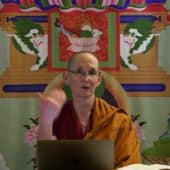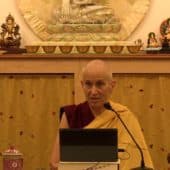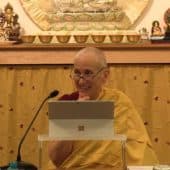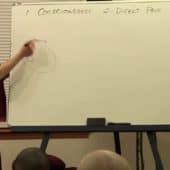Course in Buddhist Reasoning and Debate (2017-19)
Teachings on The Course in Buddhist Reasoning and Debate: An Asian Approach to Analytical Thinking Drawn from Indian and Tibetan Sources by Daniel Perdue given at Sravasti Abbey.
Root Text
The Course in Buddhist Reasoning and Debate: An Asian Approach to Analytical Thinking Drawn from Indian and Tibetan Sources is available from Shambhala Publications here.

A graded range of consciousnesses
Covering the first two consciousnesses: wrong consciousness and uncertain consciousness learning toward believing something that is not factual.
View Post
Review of internal matter and consciousness
Venerable Tenzin Tsepal reviews the sections in Chapter 10 on Internal Matter, Consciousness, Mental Consciousness and Sense Consciousnesses.
View Post
Review of abstract composites
Venerable Tenzin Tsepal gives a review of abstract composites, or non-associated compositional factors.
View Post
Review of chapters 11 and 12
Venerable Thubten Tsepal reviews Chapters 11 & 12, covering up to sense direct perceivers.
View Post
Doubt and correctly assuming consciousness
Teaching on the seven types of awareness, including doubt and correctly assuming consciousnesses.
View Post
Inferential cognizers and direct perceivers
Teaching on the last two types of consciousnesses: inferential cognizers and direct perceivers.
View Post
Four kinds of direct perceivers
Covering the sections in Chapter 12 “Four Types of Direct Perceivers” and “Believing in Something That is Real” and responding to a question about bodhicitta.
View Post
Believing in something that is not real
Covering the last section in Chapter 12 “Believing in Something That Is Not Real” and beginning Chapter 13 “Valid Cognition.”
View Post
Comparisons of consciousnesses
Venerable Tenzin Tsepal leads the class through the first few comparisons of different kinds of consciousnesses in Exercise 12.1 on page 245.
View Post
Agent, action, and object
Finishing Chapter 13 “Valid Cognition” and covering Chapter 14 “The Three Spheres of Agent, Object, and Action.”
View Post
Choosing your debate partner
Covering Chapter 15 on the topic of “Choosing Your Debate Partner” and becoming a suitable debate partner ourselves.
View Post
Challengers and defenders
Beginning to teach Chapter 16, 'Challengers and Defenders', which focuses on the two key roles in a structured debate in the Indian and Tibetan system.
View Post